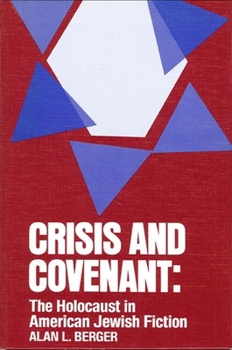Crisis and Covenant: The Holocaust in American Jewish Fiction
Select Format
Select Condition 
Book Overview
Explores how Jewish American writers have grappled with the enormity of the Holocaust.
In Crisis and Covenant, Alan L. Berger delivers a powerful and thought-provoking exploration of how American Jewish fiction has grappled with the cataclysm of the Holocaust. Situating literature at the crossroads of memory, theology, and identity, Berger examines how post-Auschwitz Jewish writers reinterpret the ancient concept of Covenant in light of unprecedented historical trauma.
Through nuanced readings of major American Jewish authors--including Saul Bellow, Cynthia Ozick, Bernard Malamud, Elie Wiesel, Philip Roth, and others--Berger traces the transformation of Jewish thought from religious and secular perspectives, exploring how the Holocaust serves as both a rupture and a point of reflection in modern Jewish narrative. He addresses the crucial question: Can fiction truly represent the Holocaust, and if so, what responsibilities do Jewish writers bear?
Divided into thematic responses--religious, secular, and symbolic--Crisis and Covenant reveals how these authors wrestle with Jewish identity, memory, and survival in a world shadowed by genocide. Blending literary criticism with theological inquiry, Berger presents a compelling study that challenges easy categorizations and opens new avenues for understanding American Jewish literature and its ongoing dialogue with history.





